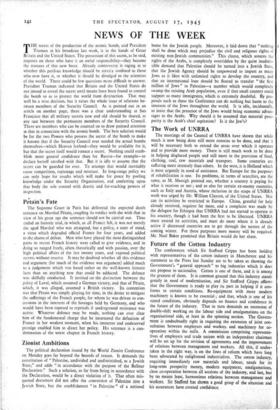Pe - tain's Fate
The Supreme Court in Paris has delivered the expected death sentence on Marshal Petain, coupling its verdict with the wish that in view of his great age the sentence should not be carried out. Thus ended an historic trial, in which, as all France felt, it was not merely the aged Marshal who was arraigned, but a policy, a state of mind, a virus which degraded official France for four years, and added to the shame of defeat. Men who have played the most distinguished parts in recent French history were called to give evidence, and in doing so ranged freely, often rhetorically and with passion, over the high political affairs of the last twenty years, and exposed political secrets without reserve. It may be doubted whether all this evidence and argument (for much of the evidence was argument) added much to a judgement which was based rather on the well-known historic facts than on anything new that could be adduced. The defence was skilfully conducted. It insisted on the distinction between the policy of Laval, which assumed a German victory, and that of Petain, which, it was alleged, assumed a British victory. Its contention was that Petain was simply playing for time, in the desire to mitigate the sufferings of the French people, for whom he was driven to con- cessions in the interests of the hostages held by Germany, and who would have been exposed to reprisals if underground resistance was active. Whatever defence may be made, nothing can ever clear him of the fundamental charge that he incarnated the defeatism of France in her weakest moment, when his immense and undeserved prestige enabled him to direct her policy. His sentence is a con- demnation of the worst chapter in French history.


























 Previous page
Previous page